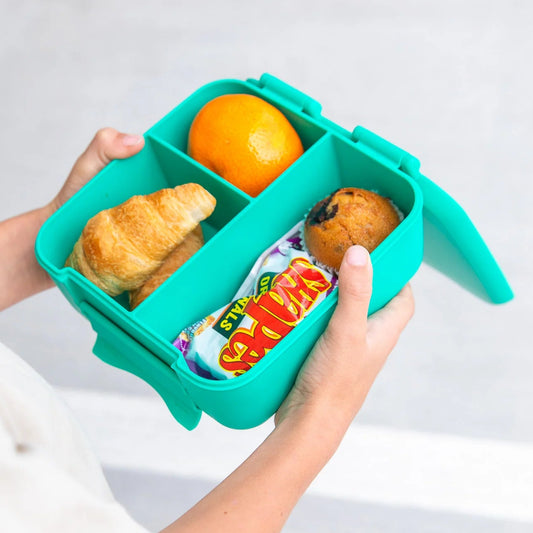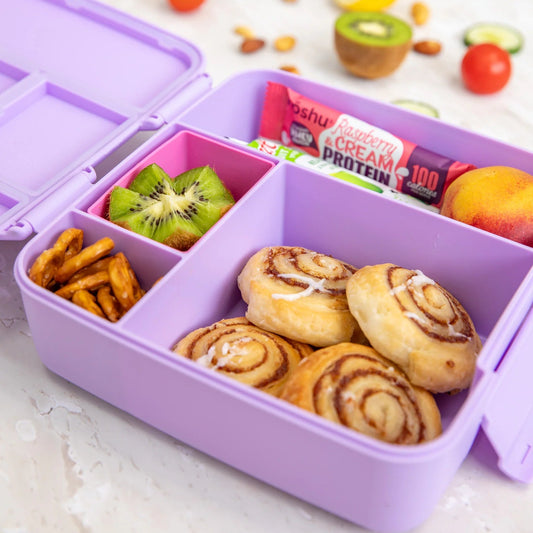 In our fast-paced, modern world, we have been conditioned to have everything ready at our fingertips. But, unless we are more conscious about the food we buy, how we store it, and how much of it we eat, we are contributing to a huge global problem - food waste. Read on as we share insight into how much food we waste, why it's a problem, and the easy steps you can take to reduce food waste today. Incredibly, reducing the waste of food in your home could save you up to $3,500 each year - that's a lot of money!
In our fast-paced, modern world, we have been conditioned to have everything ready at our fingertips. But, unless we are more conscious about the food we buy, how we store it, and how much of it we eat, we are contributing to a huge global problem - food waste. Read on as we share insight into how much food we waste, why it's a problem, and the easy steps you can take to reduce food waste today. Incredibly, reducing the waste of food in your home could save you up to $3,500 each year - that's a lot of money!
How Much Food Do We Waste?
We all know there is a big problem with food waste, but the facts and figures do continue to be astounding. So much of the food we purchase goes to waste. In fact, a lot of it goes to waste before we even purchase it. According to the excellent ABC War On Waste program, the Australian figures look like this:- The average Australian household wastes $3,500 of food per annum.
- Australia produces enough food each year to feed 60 million people which is 2.5 times our population.
- 3 million tonnes wasted per year from households and businesses combined.
Why is Food Waste a Problem?
If the food we buy is not consumed or composted, it goes directly to landfill. The food rotting in landfill produces methane, a dangerous greenhouse gas that is 25 times more potent than Carbon Dioxide. Wasted food accounts for 8% of all harmful emissions and according to a 2013 study by the United Nations, the land devoted to producing wasted food would be the second-largest country in the world! A large proportion of the resources that go into food production are wasted as a huge amount of waste happens in the production or harvesting process. Pretty scary right? Economically speaking, global food wastage causes a loss of between 780 billion and one trillion dollars a year. One of the most heartbreaking aspects of all this waste is the problem of world hunger. The western world is wasting so much that could be used to feed the hungry. For the same amount of money mentioned above, or less, all of the nearly 8 million people suffering from hunger worldwide could be fed. It just seems crazy. How did we get here?Why Do We Waste?
An interesting question. We can trace it back to World War Two. Food was not as bountiful due to rationing. As a collective we were very aware of and grateful for how much food we had. Post-war, these attitudes persisted into the 1970's with leftovers highly valued and re-purposed into a new meal. According to an ABC News report quoting Ros Sambell, a lecturer in public health nutrition at Edith Cowan University, up until the 1970's food was more expensive and harder to procure. (2) According to Ms Sambell, there were fewer supermarkets and the opening hours were restricted. Eating out and takeaway food was less commonplace. These days people have less time to cook but shopping is easier. People also walked more often than driving to the shops, so planning what to buy was key. They could only carry so much home. Ignorance of farming and the effort that goes into food production is also a factor. We are disconnected from the land and the natural process of growing and harvesting food. It just appears, perfectly packaged and sparkling in the supermarket!So, What Can We Do About Reducing Food Waste?
Like many eco-friendly and healthy initiatives, going back to the olden days is the best way. Simplifying, consuming slowly and mindfully is key. The beauty of reducing food waste is that we can start taking action at home. Every action, no matter how small, counts. Here we have 6 suggestions to encourage you on your own personal war on waste.1. Meal plan
2. Leftovers, glorious leftovers!
 As mentioned by Ros Sambell, leftovers were once seen as a more viable option for dinner. There were a lot of cookbooks in that era devoted to the art of the leftover and much pride was taken in creating leftover meals. It also provides a creative challenge and cleans out the fridge nicely. Create another meal out of leftovers later in the week, or take leftovers to work or school for lunch. A bento style lunch box like the Lunchbots style pictured, is perfect for this. Discover our range of bento style lunch boxes here >
As mentioned by Ros Sambell, leftovers were once seen as a more viable option for dinner. There were a lot of cookbooks in that era devoted to the art of the leftover and much pride was taken in creating leftover meals. It also provides a creative challenge and cleans out the fridge nicely. Create another meal out of leftovers later in the week, or take leftovers to work or school for lunch. A bento style lunch box like the Lunchbots style pictured, is perfect for this. Discover our range of bento style lunch boxes here >
3. Don't cook too much food
4. Try to buy less takeaway food
 This is where meal planning will help. Try to buy less takeaway food by using up what you have at home first, and take your lunch to work or uni instead of buying it. This also helps alleviate takeaway packaging going into landfill. Plus, you are more likely to ingest better nutrients and less preservatives with home cooked meals. Kilner's food on the go jar is ideal for when you're on the go, and will hold enough food for lunch or dinner. It features a top compartment for dips, yoghurts and dressings which you can mix in with the contents in the bottom compartment when you are ready. Discover the Kilner food on the go jar here >
This is where meal planning will help. Try to buy less takeaway food by using up what you have at home first, and take your lunch to work or uni instead of buying it. This also helps alleviate takeaway packaging going into landfill. Plus, you are more likely to ingest better nutrients and less preservatives with home cooked meals. Kilner's food on the go jar is ideal for when you're on the go, and will hold enough food for lunch or dinner. It features a top compartment for dips, yoghurts and dressings which you can mix in with the contents in the bottom compartment when you are ready. Discover the Kilner food on the go jar here >
5. Check use-by dates and adopt good storage practices
A lot of food gets wasted by looking at use-by dates mistakenly. Having a good, unhurried squizz at these dates should stop the problem. If you have a product that is approaching its use-by date, plan a meal that incorporates it. It's also important to store food correctly. Keep jars and containers closed properly, wrap and cover leftovers and cut fruit and veggies, and avoid suffocating food in plastic. Ideally, write on the container the date that you opened it, or the date you put in the freezer. The Swag produce storage bag has been specifically designed to keep your fruit and veggies fresher for longer. It comes in multiple sizes and is 100% plastic free.
The Swag produce storage bag has been specifically designed to keep your fruit and veggies fresher for longer. It comes in multiple sizes and is 100% plastic free.  Hessian produce sacks are also perfect for helping onions, garlic and potatoes last longer. The hessian material is free from plastic, and absorbs moisture and improves airflow which helps these vegetables stay fresher for longer. Discover our range of produce bags here > If you do find your food has passed its use-by date or has gone off, compost it instead of sending it to landfill, and turn it into valuable food conditioner. Discover our Bokashi composting bins, which allow you to compost all types of food in even the smallest of spaces here >
Hessian produce sacks are also perfect for helping onions, garlic and potatoes last longer. The hessian material is free from plastic, and absorbs moisture and improves airflow which helps these vegetables stay fresher for longer. Discover our range of produce bags here > If you do find your food has passed its use-by date or has gone off, compost it instead of sending it to landfill, and turn it into valuable food conditioner. Discover our Bokashi composting bins, which allow you to compost all types of food in even the smallest of spaces here >
6. Exercise your consumer buying power
A staggering amount of food gets wasted in the harvesting and production process due to ridiculous aesthetic or cosmetic guidelines devised by major supermarkets. The supermarkets blame consumers, stating that we don't want bananas that are too big or straight, or carrots that are too wonky, but we don't think this is really the case. Exercise your consumer buying power. Buy the produce that is branded ‘odd', purchase from farmers markets, and support innovative businesses that are doing something to reduce food waste instead. We are proud to support the Natural Evolution range made by a dedicated and innovative Queensland farming family to save the waste of wonky bananas. Fed up with disposing of tonnes of beautiful lady fingers that they had poured so much energy and resources into growing just because they were too big or misshapen for the supermarket giants, North Queensland banana farmer, Rob Watkins came up with an ingenious solution. His green bananas that were unsuitable for supermarket cosmetic guidelines, were perfectly good for eating, packed full of nutrients, and could be used to make gluten free green banana flour. Discover the Natural Evolution range here > We hope you find these tips helpful for your waste reduction journey. We are also interested in learning more, so please share any tips you have for reducing food waste. Bon Appetit!
We are proud to support the Natural Evolution range made by a dedicated and innovative Queensland farming family to save the waste of wonky bananas. Fed up with disposing of tonnes of beautiful lady fingers that they had poured so much energy and resources into growing just because they were too big or misshapen for the supermarket giants, North Queensland banana farmer, Rob Watkins came up with an ingenious solution. His green bananas that were unsuitable for supermarket cosmetic guidelines, were perfectly good for eating, packed full of nutrients, and could be used to make gluten free green banana flour. Discover the Natural Evolution range here > We hope you find these tips helpful for your waste reduction journey. We are also interested in learning more, so please share any tips you have for reducing food waste. Bon Appetit!Further Reading 1. https://www.huffingtonpost.com/entry/food-waste-a-tremendous-economic-waste_us_5943ca03e4b024b7e0df4afb 2. http://www.abc.net.au/news/2017-06-19/war-on-waste-australians-waste-food-because-its-cheap/8624728





































